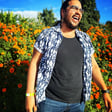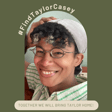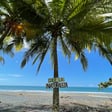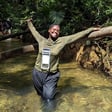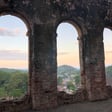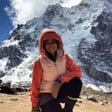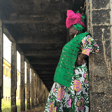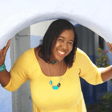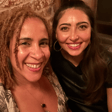Become a Creator today!Start creating today - Share your story with the world!
Start for free
00:00:00
00:00:01

Travel for Wellness: Overcoming Burnout + Food as Medicine
Janna Zinzi speaks with Angel V. Shannon, Certified Registered Nurse Practitioner and owner of the Seva Health Group, about her journey in health and wellness, the importance of integrative health, and the impact of burnout on individuals and communities. They explore the connection between travel and wellness, the significance of understanding healthcare systems abroad, and the necessity of having a strategic approach to life design, especially for those over 40. Angel shares insights on her upcoming food and wine retreat in Greece, emphasizing the importance of food as medicine and the joy of cooking.
Transcript
Introduction of Angel V. Shannon
00:00:00
Speaker
Welcome to Spirit in the Material World. I'm your host, Jana Zinze. You can also call me Jaz. I am delighted and honored to have a very special guest here with us today. Her name is Angel V. Shannon. She's a Master of Science, certified registered nurse practitioner, and the founder and executive director of SEVA Health, and the SEVA Institute.
00:00:25
Speaker
She is a force, OK? She's board certified, specializing in lifestyle medicine. And that helps you change your life, not just your symptoms, but really to live longer and to live better. She founded SEVA Health in 2013, specializing in prevention-focused integrative health for adults and seniors, which we need. So through her courses, coaching, community, and her bomb newsletters, and radical self-compassion practice. Angel teaches overworked professionals how to break free from burnout and to gain the clarity, courage, and confidence they need to design the life they deserve. Isn't that a word? That's a testimony. Thank you so much. Welcome so much, Angel. Thank you. Thank you so much for such a beautiful introduction. Thank you. And I am honored to be here. Thank you so much.
00:01:24
Speaker
I'm going to tell the folks listening that we met through a beautiful friend, Dr. Alicia Bonaparte, and really like bonded through Twitter before it got fascist-y. And I just really am always so interested in your perspective. Like I said, I'm digging up your newsletter. um But the way that you talk about health,
00:01:52
Speaker
in this holistic and integrative way, I think is so important for black women, women of color, gender expansive folks. And so I just think that there's something so relatable to how you talk about talk about health and your story.
Angel's Early Influences and Career Shift
00:02:09
Speaker
I'm not going to read your full about us, but this woman is really fascinating, y'all.
00:02:15
Speaker
I would love for you to share a bit of your story of how you started your business, how you started Siva Health. And although this is like, this is a travel podcast, right? Travel, arts, culture, spirituality. What you do, the the the wellness piece, I think is such an entry point to why travel is connected to this. So I'd love to just hear a bit about your journey, if you can share with folks how you got to this place.
00:02:43
Speaker
Sure. And thank you so much for allowing me to have this platform because the timing could not be more important. um You know, our stories are so layered, right? There's just a layer beyond and a layer beyond that and a layer beyond that. I'm going to try to just get to the root of it.
00:03:05
Speaker
I grew up with two sets of households, my mother's household in New York and my grandparents in rural Georgia, and I mean really rural Georgia. Every summer we got on the Greyhound bus or the Trailways bus from, what is it, not Penn Station. What's the station in New York? Oh yeah, Port Authority. Yeah, the Port Authority.
00:03:29
Speaker
and made that long ride down south where we spent our summers with my grandparents, five acre farm. My grandfather built the house that they lived in. He and his, his and my grandmother and built the house that my great grandmother lived in. And every summer,
00:03:48
Speaker
you know, we'd stay with them. And it was the most delightful experience for me. That was my first foray into traveling, right? This long 18-hour trek to their farm, their home. And we'd, you know, do everything that they did. We'd, you know, pick tomatoes,
00:04:11
Speaker
pick art, you know, collards, all the good food, right? They truly helped me understand this concept of food as medicine, this concept of wellness and well-being, true wellness and well-being. It wasn't about having more, it was about being more.
00:04:32
Speaker
and this sense of expanse expansiveness you know i'd i'd be out on the farm i'd go fishing with my grandfather he was the first person taught me how to beta a ah hook and so that that feeling of wellness and community and being in in their small but large community of others who were growing their own food, um you know saving seeds, fishing, living off the land. That cultural experience for me was foundational. I never thought then that I was going to do anything in health and wellness and well-being and nurse practitioner and you know all this kind of thing.
00:05:11
Speaker
I wanted to be a lawyer. That's what I really wanted to do. I wanted to be a lawyer. I came up during the days where everybody was getting their law degree, going to work for IBM and living in in Connecticut somewhere, right, or New Jersey or what have you.
00:05:25
Speaker
And through a series of of personal events, um a a early marriage that wound up in ah in a very painful divorce, a change in gears, the need to hurry up and finish college and get going with my career, I went into nursing. Had a very good friend who was an ICU nurse, and she worked at Metropolitan Hospital. Oh, I think it's Metropolitan Hospital in New York City. Yeah, yeah, yeah, in Brooklyn.
00:05:55
Speaker
And she was fascinated with intensive care unit nursing. She said, Angel, you should see. I mean, that heart attacks and ventilators and all this stuff. And it sounded really exciting. And she was in a two-year program. She said, Angel, you can get through this. You can do this two years. You'll be in and out, like, get started.
Founding SEVA Health and Integrative Medicine
00:06:15
Speaker
And nurses were making really good income at the time, and still do. And so I was like, you know what? I'm going to do this.
00:06:22
Speaker
And I was hooked. The science of the human body just fascinated me. But what also stayed in the back of my mind always was that this is not the way we're supposed to be living. You know, I would have patients that would be in and out and in and out and in and out because of eating the wrong foods or not knowing that the blood pressure really shouldn't be 190 over 100. That's not a good thing. Like health education was the missing link. And they these were my people, my black people, my people of color who were suffering for lack of just knowledge of how to care for themselves.
00:07:06
Speaker
And I knew then that I had to find a way to talk about wellness natural science based wellness and health and help people understand the science of their own human body.
00:07:21
Speaker
Get back to what I saw in that farm about food as medicine, growing your own food, the power of herbs and herbals, and how to marry those two things because they can coexist. Never saying that allopathic medicine is, you know, not good stuff. We need to be able to diagnose cancers and all these other things.
00:07:43
Speaker
But what do we do when we have that diagnosis? How can we bring the best of Western medicine's diagnostic capabilities together with Eastern African Asian traditions and make it make sense? Southern traditions, right? And so that became sort of like my mission. Like I know these two things can coexist and I either am going to find it or I'm going to build it.
00:08:12
Speaker
And because I was never able to find it, I had to build it. um And so that's that's kind of how SEVA Health started. and And having been in allopathic medicine for so many years, 20 years, ICU, ER, r shock trauma, community nursing, insurance companies, some of which I will not name.
00:08:36
Speaker
And knowing how this system works, because it is a system, and ah knowing the design of the system and what the outcomes, what the desired outcomes of the system are, having been on that inside for so long, I knew enough to know how to build a system within a system, a practice that could exist within the system, but also move those outcomes um more toward the benefit of the patient, the benefit of the community. Because healthy people make healthier communities, and healthier communities make for a better world that we all would want to live in. So that became my mission, is is really sort of marrying those two
Personal Stories of Burnout and Healing
00:09:20
Speaker
worlds. And that is what integrative health really is. It's not either or, it's end.
00:09:27
Speaker
yeah So one of the parts of your story that I i thought was so relatable and really informs your practice is the idea of burnout and working with folks to prevent burnout and how burnout affected you and and put you on this path.
00:09:48
Speaker
if you could share a bit about that because I know myself burnout and like physical illness from stress is what got me to move abroad for the first time. yeah And I still think about those promises that I've made to myself of like what I will and will not do and how, you know,
00:10:13
Speaker
You negotiate that sometimes just in your you know once when you're healthy or things are you know moving in a certain way, it's easy to get back to old patterns or just kind of like be in, especially in the United States, be in the oh yeah you know hamster wheel of it. So I'd love if you share a bit about how burnout impacted you and put you on this path and how that informs the work you do with your clients.
00:10:42
Speaker
So I, as I said, was working in intensive care unit, ah yeah ER r and shock trauma, and money is a very powerful motivator, right? it's It's a hell of a drug, I always say that. When bills are getting paid, you know, and when lights are on and, and you know, nursing is the kind of thing where you can work three 12-hour shifts,
00:11:05
Speaker
and be off for five, and then work another three, 12-hour shift. But what people don't know is that the 12 hours are never 12 hours, especially when it comes wintertime in the Northeast or the Mid-Atlantic. So I'll never forget my pivotal moment when I was working a 12-hour shift on the night of the worst blizzard in the Mid-Atlantic And every time I share this, I can see myself right there all over again and I can feel the emotion of it. I was working the the weekend shift Friday, Saturday, Sunday, because I had young children and I needed to be home for them during the week to drop them off, pick them up, blah, blah, blah. So I worked what we called weekend option Friday, Saturday, Sunday. And of course, snowstorms always happen on the weekend, right?
00:11:53
Speaker
So when I'd left home that evening, the snow had started and started picking up and whatnot, and I knew by the time I clocked in that because of the the amount of snowfall that it wasn't going to be a 12-hour shift, probably going to be 16 because it was just coming down so much.
00:12:09
Speaker
And somewhere in the middle of the night, our directors had had made the announcement that given the amount of snowfall, expect delays for the staff coming in to relieve us, we would likely wind up, you know, staying over. They were going to be sending out these vans and things to pick up the other nurses and whatnot.
00:12:28
Speaker
And of course that happened, you know, people were trying to get lifts to come in, not lift the lift lift, but get a lift from someone else. You know, cause this is way back when, before lift even, you know, was a thing. And I'll never forget the director saying to myself and a group of nurses that we were not permitted to go home, ride or no ride, relief or no relief. They did not want us to leave because of the risk of not being able to get back.
00:12:57
Speaker
Bad and bad enough, we had already worked a 16-hour shift. But what they'd said is, regardless if you're due to come back or not, you're not to leave because we may need you, number one. If you do leave, you'll either be written up or terminated. If you stayed, you needed to hurry up and get upstairs because there were just a few select rooms that they'd they'd had set aside for us to stay over in. There were a few select beds.
00:13:27
Speaker
And if you didn't get a bed, unfortunately, you'd have to sleep on the floor. This is what they're saying to to professionals. And I remember thinking, this is not my life. This is not my life. Some of us had young children we needed to get home to.
00:13:45
Speaker
you know elderly parents that we had to look in on, and the threat of being terminated, losing your income because you're trying to get home to see about those who are who power had gone out. There was no heat at home for some of us, the the you know children or whatever.
00:14:05
Speaker
And I just said to myself in that moment, you know, I thought about all the things that I had sacrificed, all the the the the swim meets I hadn't gone to, the PTA meetings. I mean, I was tired. I was really, really tired.
00:14:21
Speaker
And I realized how tired I was in that, all the 16 hour shifts, not even just for that blizzard, all the times that we were short staff, nothing we can do. Uh, you know, not enough step, nothing we can do. The number of times I had driven home from downtown Baltimore getting on 395. And when you go around that curve, the sunlight in your eyes,
00:14:45
Speaker
and literally trying to keep my eyes um ah open on the road to keep from running into someone. That's how tired I was. And it wasn't just me. There were other, you know, and I knew right then and there, I can't keep doing this, money or no money, holidays or no, you know, as I said, that type of schedule that we had, you could work three days and have five off. You could be vacationing every other week.
00:15:11
Speaker
but i knew in that moment i can't keep doing this and i felt the fatigue in my body i had been denying it up till then you know we go downstairs we get a coffee you make it through the night you go down you get a little snack out of the machine you make it through you just keep making it through and and telling yourself i should be grateful for this job i should be grateful for this income who else on the planet can travel like i do with my three days off and blah blah you just keep rationalizing it And that's what I think you were referring to. like you You just keep rationalizing that you are okay, maybe you're just tired, maybe you need some self-care. Burnout is way past needing self-care. No amount of getting your nails done, getting your hair done, massage,
00:15:57
Speaker
That is not it. Burnout is way past that. Burnout is beyond physical. it's It's even a psychological thing. I even had a patient recently who took a whole month off and did absolutely nothing. And she said, I cannot believe that I just, I spent the whole month like in bed. This is how tired I am.
00:16:23
Speaker
She said, Angel, people say, why don't you get a massage? Why don't you? She said, even that feels like too much. That's why when people are burning out, you don't ask them, you know, come on and do this. Let's do that. Because doing just one thing feels like too much.
00:16:41
Speaker
Just too much. Why don't you go to therapy? Even that feels like too much. That's how depleted the body is. Mentally, physically, spiritually, all of it. You need a total body reset head to toe. There's so much re-fresh and renewal that has to happen when a person reaches burnout.
00:17:10
Speaker
and And I just want to add this. Burnout doesn't just affect the person. We're talking about loss of income. We're talking about lack of presence, not being able to show up in the world to share your gifts and your talents. You are a human being. You are endowed with amazing talents and strengths that the world needs. Imagine being that point of light and having that light just extinguished and that over and over and over throughout our communities. How do we get to where we are now in the world? Well, a lot of people are burned out and checked out. yeah Checked out because they are burned out. They have nothing left to give. And that means a whole lot to me when it comes to human capacity.
00:18:05
Speaker
What is the point of living if you are not thriving, if you are not able to give and experience the fullness of your humanity? I think it's a crime. That i mean that that hits so much just in terms of what we're seeing ah in the ways of like conversation online or just people that we know.
00:18:32
Speaker
you know
00:18:35
Speaker
folks are in like survival mode, I think, a lot. And I think about it in like a um you know United States context, and I think about it, we're this extremely privileged country, right?
00:18:52
Speaker
And at the same time, folks are spent. Folks are burnt out, overstimulated, like, tweaked out. yeah I saw this clip, it was like a TikTok or something, and it was this person laying on the bed, and they're like, oh my god, it's too much. I have to like figure out what to eat, to do my laundry, to do my work, how to get on the bus, how to use my phone.
00:19:21
Speaker
to, you know, like just all these kind of like very mundane things. Right. And they just kept naming them. And then at the end of the video, they're just like, ugh, you're on the bed. Right. And it's really, it's so true because it's like regular adulting, you know, like painting myself. Yeah. Yeah. It's a thing. It's a thing. People are spent. They are spent. And then I think about, you know, again, like,
00:19:52
Speaker
in that United States context, right, where it's like deep capitalism, when you just said money is a motivator. And it is, you know, like bills are real. he You know, rent, mortgage, whatever, phone bills, yeah credit cards, all the things um that people are doing. You know, these are like survival things. It's not just like, oh, I'm going out and buying a Birkin or whatever, like regular life stuff.
00:20:20
Speaker
And so just thinking about that context of our pace of life versus external like other countries. right Yes. And so for me, I got burnt out.
00:20:35
Speaker
It was 2013. I was living in in New York at the time and running my own, which I still have my consulting business, communications consulting. And I got physically ill from stress. like I got this crazy eczema all over my face, on my arms, um on my nipples, which was awful.
Healing and Transformation: A Deeper Dive
00:20:59
Speaker
And the wild thing about it is that I was doing burlesque at the time.
00:21:03
Speaker
And it was like, we used pasties. You know, you put them on your neck. And I was like, I can't put anything on them.
00:21:12
Speaker
Not the tatas. So acute, like, of all the places. It wasn't like, it was just my face, which was like, I have to be out in the world, right? So now I'm afraid to go talk to people because my face is cracking open. I can't perform because my nipples are busted open. My arm, like, it was the wildest thing.
00:21:32
Speaker
and can't perform at something you enjoy that i love that you love doing. That was it was such a weird wake-up call for me and I ended up doing this like super cleanse where I just like made this big pot of vegetable soup and I was just drinking that for like five days. Yeah. And did a, what is the thing that they call the colonic I think I call it? Mm-hmm. Mm-hmm. high colonic. Mm-hmm.
00:22:04
Speaker
You know, and what I just, and it was interesting because my, it was starting to get cold, which I hate the cold, and my lease was running up, and they were gonna increase my rent by like $500 or something obnoxious, and I was like, oh, hell no, not being in the sticks of Brooklyn. no like not happening. No! And so earlier that year I had been to Isla Mujeres and I was like you know what maybe I could like go there for months of Tennessee you know and and it was really this wake-up call and i I really it makes me sad to think about that like a lot of times we need these big you know crises like health crises.
00:22:54
Speaker
to really integrate, make changes in our lives. um You know, but also I'm very grateful for it. And there's something that you said that I'm taking from your website that was on this, kind of on this note. And I really, I love this so much.
00:23:15
Speaker
Healing is not a cure, but a transformation of view and perspective. It is a letting go of everything that is not you. All of the beliefs, all of the self-defeating narratives to become more of who you already are and were equipped to become from the very beginning. Healing is everyday work.
00:23:35
Speaker
What I've learned is that rock bottom is not the end of the world. In fact, it is often the brightest beginning and the most fertile foundation for writing new stories and planting fresh seeds. Rock bottom is the one place that forces us to let go of who we thought we wanted to be in order to work through our many layers so that more of our true selves can be revealed.
00:23:59
Speaker
I've learned that there are no bad decisions in life. There are simply choices we've outgrown and lessons that reveal the person we no longer wish to be. There are no failures in life, just roads that come to an end so that new journeys can begin. Disappointment and sorrow are the price of being human.
00:24:17
Speaker
This is bars. The gifts, however, are intuition, courage, and the power of choice to reinvent ourselves, to shed old skin, carve a new path, and lean further into the voice that lies within. Listen. yeah You know, I read that, and I was just so i was so moved by that. It just like hit me in the chest in like the most beautiful way. Thank you. um Because that is, you know I think, having these health scares. And there's been others not as intense or not as like visceral, I would say, that you know have caused me to make changes in terms of you know lifestyle.
00:25:03
Speaker
and um and travel has been a part of that and you know sometimes it's a physical rock bottom sometimes it's a spiritual yes ah very much so you know it can be you know mental which again to me an emotional is connected to that spiritual sense um that has gotten me to make moves in terms of like physical location. Yes. um You know in addition to who I'm surrounded by and you know to bring it back to the the time when I moved to Isla Mujeres I met another sister who also shared with me something similar that she had like a health care and or you know ah help something happened with her health and um you know that also was an impetus for her to make moves. and Absolutely. You know I'm
00:25:51
Speaker
We've had we've been having this conversation a lot about moving abroad right and you know what it is to Step away from this like system. Yes. that word Yes it's da Yes, and to take ourselves outside of that context and and to see how other people are living So I'm curious, you know moving is not always an option for people. Mm
The Role of Immersive Travel in Wellness
00:26:16
Speaker
-hmm. Mm-hmm or moving can be, but it's something that takes time and planning and consideration. Absolutely. a lifestyle is But you integrate travel into your wellness offerings and I'd love to hear more about how you see that connection, why you feel like travel is connected to you know perhaps healing that burnout or you know just general wellness.
00:26:41
Speaker
Yes, wonderful questions. Thank you for sharing your personal story too. And I want to just tap into something that you said, or as a friend of mine says, uplift. I want to uplift something that you said about the United States specifically. One of the things people do very well in the United States is cultivate parasocial behaviors.
00:27:07
Speaker
And parasocial, for me, means this idea that we can become the things that we see. We talk about capitalism and you know paying bills and all these other things. But specifically here in the United States, we have something that I say you know we really need to we need to think about is the degree to which we worship celebrity lifestyles.
00:27:37
Speaker
We almost worship it so much that we think we can become these people, right? If you just work hard, if you just create the right funnel, if you just create the right system, you know, you can make, you know, a million dollars, you can make. So some of the burnout is absolutely from everyday working to pay bills.
00:27:59
Speaker
But some of the burnout, a lot of the burnout, is this hyperachievement. This reaching toward things that we see and lifestyles of the rich and famous. Remember that show, Lifestyles of the Rich and Famous? Housewives of such and such.
00:28:16
Speaker
You know, we have this almost like obsession in the United States. And that's to say it doesn't exist elsewhere because the United States exports a lot of things, not the least of which is is cultural, you know, things, beliefs and stuff.
00:28:32
Speaker
And what I see a lot is people doing a lot of things. There's a lot of doing. There's a lot of this belief that if I just do more, if I just try harder, if I just create a side hustle.
00:28:50
Speaker
you know, a side grind, right? This idea of not having enough, not knowing what is enough. We see that playing out now. Billionaires, people who have more money than they will ever spend in a lifetime. And having been a clinician for 31 years, I will say right hand, God, I've met one person who on their final hour and their final hour on their death bed has said, I wish I had made more money. I wish I had more money. I wish I had, usually it is, I wish I had more time.
00:29:29
Speaker
I wish I could have gone to more of my girlfriend's burlesque shows or I traveled to see her when she performed at such and such, right? So what has to be unpacked here and and and really dealt with is this enough ism.
00:29:45
Speaker
Like what is it that is missing in American life that keeps people just beyond? And I'm talking not talking about paying bills and and really making an income. I'm talking about that large subset of burned out folks who are trying to achieve a status in life that, you know, makes them think that that's that's making it, right? I will have out made it when I have this car or this home or this what have you.
00:30:16
Speaker
buying things that, you know, you know you can't afford, you know, trying to flex, as we say, you know, that that just keeps you on this hamster wheel, right? And I think that when we talk about travel, and to your point about Isla Mujeres, especially when you went to Isla Mujeres, way back before it was the thing, you know, you know I've talked about this,
00:30:43
Speaker
You know, stepping out of that, stepping out of that and into a slower pace to calm down, like you had mentioned in the beginning, this this this overactive nervous system, this survival brain, that is what travel, immersive travel can do for you.
00:31:02
Speaker
I'm not talking about the type of travel of finding the, you know, the biggest, most swank, you know, resort and, you know, running out there with your wristband and your towel and claiming your space at the pool. I'm not talking about that. I'm talking about immersive travel where you literally get to turn off that overactive, hyperachieving survival, I gotta do, do, do mind, a slower pace.
00:31:32
Speaker
calming the senses, going places where it's just you and nature or it's just you and a couple of other folks. You know what I'm saying? Like you really, this is this is what good immersive travel can do for you. And I love that that is so central to the work that you do, you know, off beaten trails and paths and seeing and and really getting into the culture.
00:31:56
Speaker
That is what I would hope would come, would be the genesis for the discussion about moving someplace. So before we talk about moving and living and uprooting, you know, you gotta plant seeds, right? And those seeds can be planted through immersive travel. Going a week here, a week there, staying someplace that is not at the resort.
00:32:22
Speaker
maybe not even the Airbnb, depending on where the Airbnb is, but can really give you a sense of who you can become outside of this whole paradigm, this the social construct that we have built here in the United States. and and And this could be said of any place. It could be you know wherever people build these these social
Healthcare Abroad: Planning and Continuity
00:32:44
Speaker
structures.
00:32:44
Speaker
which is practically everywhere, but just but just doing that as a starting point, knowing that immersive travel is that seed planting stage. You know, you look at a wildfire. Nature is the greatest teacher. It is the greatest teacher. When there's a wildfire that comes through and anyone who's ever seen a wildfire or has knows someone who lives someplace where there are wildfires, you know the brush.
00:33:09
Speaker
clean, I mean, you're just whipped through. There's enough, it seems like there is nothing there, but it is the most fertile ground for planting new seeds, for building something new. And though it may destroy all that was there, you know, and there's sorrow about that and grief and loss, especially through, you know, physical loss with burnout as we use that as a parallel.
00:33:33
Speaker
What we have to learn is that this is the greatest opportunity, the the greatest opportunity for growth, for creating something new, for for entering the world in a new way with fresh eyes and a fresh perspective. When you travel, I mean, you know this, the food being different, the language being different,
00:33:57
Speaker
I mean, I think that's it's just the the greatest tragedy right now is is you know the knocking down of the discussion about diversity. Forget about diversity in the workplace, just diversity in life, being some place where you don't know the language and that being o okay and allowing that two me up to be a, d b to spark curiosity, to learn and to grow. That's what travel does. It stretches your mind.
00:34:30
Speaker
in ways that you will never experience sitting in your same place day after day after day. And what's sad is that we don't talk enough about immersive travel. You know, people travel and they go places, but again, that survival, fear-based, oh my God, they don't speak, that I don't know, how come they don't speak English? How can you ask that when you're going to visit someone else's, you know?
00:34:58
Speaker
right right And I think to your point, the you know the FOMO part of like trying to do the most, right you know of like, I gotta go take this picture and do this photo shoot here and you know do all the things. And I know I have a tendency to want to do all the things, less so I can like show it because The amount of footage that I have on this sad iPhone that is screaming at me like yeah that I have not posted or done anything with, there is a tendency for me to like experience and document and boh blah, blah, blah. But you know to your point of the, like it's so interesting, I never thought about it, like this obsession with celebrity and this like the the obsession of showing off. And and off, you know before we started recording, we were having a conversation about
00:35:49
Speaker
you know different platforms and you know um some of the ways that people talk about the things that they're doing in a way of like that's very showy of like look at me and also like what you said about sales funnels is like look at me i did all these things and now by my core right you know it's like you know like ah and i equate it to you know with burnout and with you know content creation and all these other things of like I've retired early right by my course, and I'll show you how. and And so my best friend, we always laugh about it, because it's like, if you really retired early, you wouldn't be selling me no classes. If I retired early, if I retired today, the one thing that I'm doing is sitting here writing an email and putting some so something in a sales funnel. like um Let me tell you, for a walk big time. Big time. I'm flying. somewhere like my the Exactly, exactly. We're living in the, we're living in the, you remember years ago, and you can get all of this for $19.99. Call in right now and we'll throw in an extra one.
00:37:02
Speaker
and yeah But if you call within the next 10 minutes and meanwhile the commercial comes on again tomorrow night and the night after that ah three years later it three Stop it. You know what I mean? Just stop it. Stop it. Yeah. And it's it's it's it it really is exhausting. It's exhausting for the people who are trying to do that. And it's also exhausting for those of us who are viewing it. And what's interesting, I'm seeing a lot of posts and discourse in in public discourse about the number of people who are going back to nine to fives. Have you seen that? A lot of people who are like, you know what?
00:37:44
Speaker
I've had it. I have had it. It's a hustle. You know, whatever their business lines were there, are a lot of discourse now about going back to the nine to five people want their lives back. They want their time back. And I tell you what, I'm happy to see it. I'm happy to see it because it's not for everyone. It's not for everyone.
00:38:10
Speaker
And even to your your your question earlier about the moving abroad, let me tell you, it's not for everyone. You know for yourself, Isla Mujeres now is not the Isla Mujeres it was then. No. It's not. Most places that yeah you know even ah when I lived in Costa Rica, in the Caribbean coast, like that was three years ago.
00:38:38
Speaker
Coming on for and it I went back in August and it's so different. It's different. It's different I mean every place changes even you know, I live in New Orleans folks talk about I see posts all the time i miss the old new orleans Everyone says that yeah, just even the time that I first started visiting to where it is now is vastly vastly different You know, like there's always You know, nothing is static. No, it's not. attic And also too, like, you know, that's what that's why I was so happy to have the conversation previously about like the realities about moving abroad. And like, it's not for everybody. Also, like, please go do it and try it. you know
00:39:23
Speaker
Yeah, I mean, I'm not the the the moving abroad police, right? Like if you think that's what you want to do, you know, but here's here's what I will add, you know, from a health care perspective.
00:39:35
Speaker
Be aware that health care in other parts of the world is not the same. and I mean, you know, and and that may sound like, duh, yeah yeah, we know that. But you've got to see it play out in real time. You know, here where I live here in Maryland, there's an urgent care center on every other block.
00:39:55
Speaker
Urgent Care is a relatively new model, you know new in the sense of the last 20 years or so, but it doesn't exist in many other countries. There's no such thing as a nurse practitioner in Mexico that I know for sure.
00:40:09
Speaker
So that leaves one population of providers, doctors, you know to to manage all of the care. you know Good thing about Mexico, you can go to laar the pharmacy and get you know you you know many of your prescription things, which is wonderful without even seeing a a provider, but you better know what you're diagnosing. You know you say, oh okay, I need azithromycin for this cough that I have. You better be sure it's azithromycin and you better be sure it's just the cough and not bronchitis.
00:40:37
Speaker
or pneumonia so it's it's the kind of thing that from a health care perspective what i always caution people about especially those who are in midlife and just for the record if you are 40 or over you're in midlife because statistically if the lifespan is 80 to 85
00:40:57
Speaker
If you're at 40, 40 is a half of 80, right? If you're 45, that's half of 90. So welcome to the midlife world. Because when you say that to folks in their 40s, they don't like midlife. That's not me. I'm touching my pearls.
00:41:12
Speaker
Like I know this is true, and I'm also like Hey, unless unless you know something, I don't know. you know I mean, i know I have a patient who's 102, but even still, 50 is midlife, right? So this is the age when the when the bills come due. you know This is where those you weeks and weeks and months and months of not sleeping well are impacting the heart.
00:41:36
Speaker
you know the weeks and weeks and weeks of skipping meals and, you know, crushing it all night long. And and and and to my point, in my case, going all night 16 hour shift and just having enough snacks to get myself. I said, no, there's no way I can keep going like this. There's just absolutely no way. And so I say to those who are in midlife, you know, if you're serious about you know immersive travel, number one, but more importantly, living elsewhere, moving abroad, wherever that place is. You want to really be digging deep into
00:42:15
Speaker
what the the health systems are, what you can lock into here in the United States you know that you are familiar with, that you that is portable enough to take with you where wherever you're going. So let me give you an example. Concierge medicine, which many people frown upon, is a style of medicine that puts the control back in the the the hands of the provider and the patient.
00:42:41
Speaker
It's direct pay model. so There's no insurance involved. It's the provider setting their own fee structure and saying, you will have access to me. We will do these labs. We will do and yeah longer appointment times and this kind of thing. It's all self-pay. This was 30 years ago, concierge came out, but it was very you know an elite thing. you know It was like very, very expensive. It's only for a select group of people who could afford it.
00:43:09
Speaker
Fast forward 20, 25 years, people's incomes have gone up, and people have learned more about this concierge model that, matt man, you know what? I'm paying insurance every week out of my paycheck, and I get a 15-minute appointment, and then I got to chase you know this dog to town just to get an answer. I really want all my paying a little extra so that I can have my questions answered.
00:43:31
Speaker
So now we have these concierge models that allow you to have your doctor or nurse practitioner or health care provider be a partner in your care. Because it is a self-pay model, it allows them to have a smaller panel of patients, so maybe 50 to 100 patients.
00:43:48
Speaker
But the beauty of it is it's portable. Telehealth, now they're not going to be able to listen to your heart and lungs wherever you are across the seas, but what they can be is a consultant to you so that when you are being cared for here and there, it's, gosh, I just got my labs done and my cholesterol is 200 and da-da-da-da-da, what should I do? Now you have your US-based provider.
00:44:10
Speaker
Who knows what you should be testing knows whatever ah extra lab you should be getting knows that not to say these don't abroad I'm not this is not to disparage anyone you know any other health care providers around the world I'm talking about familiarity.
00:44:25
Speaker
So you've got this person who can be a partner in your care, who can collaborate with whomever your providers are, wherever you are, who knows your health history, who, if you have to fly back home, can help you expedite some care here back in your your native country.
00:44:43
Speaker
These are the things that I'm encouraging folks who are truly serious about, you know, because you said our hyperactive, you know, overactive survival brain is just, I just want to get out of here. But those who want to take a step back and be thoughtful and create a strategy these This is some of the strategizing work that I'm doing with my patients from a wellness perspective or from a wellness perspective. Those who have said, Angel, I am serious. I really need for my mental health ti ti to get going here and and have started planning
00:45:18
Speaker
but they know they need to have a strategy. There's no way they're just going to pack up and go, you know, so this is the unpacking that I'm doing in lifestyle design and in my coaching work is let's take a step back and let's create a plan. Let's create a strategy. Let's talk about all the things you need to do to do this, you know, well to measure twice, cut once because there's nothing like moving out of the country and have to bring yourself back because you didn't think it through.
00:45:49
Speaker
You just drop gems. Like, I really want people to understand how what you said is so brilliant. And it is. There's a strategy to it. And what you said, I never, I love how you broke that down. And I think that's such an incredible service because, you know, that when you're over 40, your priorities are different. Yes. um You know, I look at a lot of different creators and such and I'm like, they're like, oh, I lived here for a week. I lived there for a week.
00:46:18
Speaker
And I'm like, oh, I remember those. Yes. yeah And 44. I'm not, I don't got the energy, the patience, you know, like stability is important to me. And also the health piece is incredibly important to me. And, you know, especially if we're thinking about you know, long term moves, right? If you're like, like you said, it's not just like, oh, I'm going to move. And then, oh, no, now I got to pack up and go. Or maybe I'm not packing up and going back to the States. But like, where do I go now? Exactly. That's that's stressful. And, you know, if you're I think a lot of us who are, you know, over 40 and are thinking about like, well, you know, we may not be thinking about moving tomorrow, but or next year. but
00:47:06
Speaker
for on a retirement level, when you're older, you need to be by good health care. And so yeah that's something that has been incredibly you know important to me. Like when I lived in Costa Rica, when I was in the Caribbean coast in particular, I had a um this wild thing happen to me. I got a concussion. i was like It was like a freak accident. I felt this waterfall. The concussion was the best.
00:47:32
Speaker
ah case scenario like it could have been properly worse and that really put into perspective to me because like where that is you know as most places in the world where you have black folks you're going to have like the you know lowest quality care you know it's the worst hospital in the country is the one that's the closest you know that's the same in the United States right exactly that's to the point of what you were saying is like you know having that
00:48:05
Speaker
system of care in the United States is so important because, A, anti-Blackness is everywhere. Everywhere. You could be an American with money, but if you're a Black woman, chances are, you know, people are bringing their biases, you know, and there's been cases that I know of this, particularly in Costa Rica where people have had issues. Oh, yes. You know, so it's like,
00:48:28
Speaker
For me, making those moves, I can't divorce as a person that's getting older. I can't divorce that and that part of like, I need health care, I need a doctor to know if I go to this hospital, they're not going to be like butchering me or letting me sit. Exactly. Or, you know, they're just under resourced so they actually can't do. ah Right. I mean, Jazz, take something as simple as walking down the street drinking your water and mind in your business and not realizing that the you know there's a step down twist your ankle right let's just say you're living in any other country twist your ankle okay someone some kind citizen gets you to the the urgent care center they strap it up or what have you tell you six weeks six weeks comes and goes and it's not healed well you need physical therapy
00:49:22
Speaker
is there Is there a physical therapy model of care there? Is there such thing as physical therapy? Are you left on you to your own devices? right i mean I know several people on my Instagram feed who had strokes this year, who were early 50s and have been posting and posting and posting about their stroke recovery. I mean, look at Jamie Foxx with his special about the about his stroke. There is a massive amount of therapy that goes into post-stroke recovery. We're talking about sometimes learning to feed yourself again, hold a spoon, be able to to pull up your clothes with but both hands, to stand up without being dizzy. I mean,
00:50:07
Speaker
That could happen to anyone. you know So my point is that understanding the healthcare system where you are going and where you you know the lux life that you are going to be having, be sure that those services, and I'm talking about all the services, not just being able to see a doctor, but the recovery services, the home care services, the the you know just being aware of that. Is there an insurance to be had as an expat. Not all places will allow you to be, you know,
00:50:43
Speaker
receiving their government services as an expat. There is no insurance in some places. Some places it's still paying out of pocket. The old-fashioned way that we used to do with my grandparents. You know, I used to visit my grandparents. That still exists in many places. There are no subsidies and things like this. So I'm not trying to prop up the United States. I'm not saying that this is the be all and the end all. What I am saying is that you got to get real about what your expectations are. Be be you know be clear on why you're you're wanting to move and have these experiences and then even consider dual
00:51:24
Speaker
living somewhere. You know, what's the harm in saying, you know, if you you really can do that, hey, I lived there for a couple of months and then I'm back home
Living Abroad: Lessons and Wellness
00:51:32
Speaker
at such and such. You know, there's so many different options. And that's the beauty of someone working with a professional like yourself who is not just talking the talk, but has walked the walk, who can absolutely, this is not about buying a course.
00:51:49
Speaker
This is about you understanding and really having someone who can take that deep dive of with you. If you're serious about that and you want to do it without burning out somewhere else, because now you're just in another place. Isla Mujeres is beautiful. It's beautiful. It's still beautiful, but you can be burned out over there too trying to make ends meet.
00:52:12
Speaker
trust them be like When I was in Costa Rica, it was so funny like you know just realizing how much I was working and how much you know I couldn't take time off. I just want to go to the beach. And you know the wild thing about that concussion is that that whole time period was so wild. it was like Slow down. I know many things were happening. My cell phone on the way there died, completely died. It was a new phone. It was three days old. Completely died in the airport on my way. And I was like, well, I am not stopping in Atlanta to come to the Apple store. I'm just going to figure it out. And then as soon as I get my new phone and working remotely, we're honored. We do so much on our phone. We do so much, yes.
00:53:07
Speaker
like out and about like i can't you food yeah my phone Yeah It's replaced and Then I think it was like maybe two days later my macbook dies. Oh my goodness shut died and I was like, oh You were getting some serious signs. So then I was like, oh my God, what are we going to do? Did I go buy a Dell that I haven't used since like 1999? No disrespect to Dell. But going from a Mac to that was very stressful. I was like, I still have to work. You still have to work. Exactly.
00:53:48
Speaker
maybe about a week after that is when I have the concussion. And then with that, it's so, so like you can't look at screens. Exactly. I could not work at all. Exactly. And I had to walk very slow, like everything I had to do was very slow.
00:54:10
Speaker
that was like not the way that I want to learn that lesson. No. Right. But it was such a like, oh, I have to be present. And, you know, it it enforced this slowdown. And I think about that year, like, I remember thinking, like,
00:54:27
Speaker
Oh, I'm gonna go crush it when I go live outside. I'm gonna just make a money and save it. and but but yeah I made out of the last five years, let's say the least money, the year that I live in Costa Rica. And that was like also a conscious choice of like,
00:54:42
Speaker
Exactly. A conscious choice. I need my time. yeah know like I just want to go stare at the ocean for two hours. Exactly. I'll get a fresh juice and that'll be dinner for the night. you know it's And it's okay. Exactly. And that's when it's real wellness, when it's made from a place of intentional, conscious choice. like i am making i am I know this is a trade-off.
00:55:11
Speaker
um because that's what life really is anyhow. It's just one trade-off after another. But I'm willing to do this for this stretch of time, you know. And as long as we're moving with that intention and that spirit and that sort of like, you know, that foundation, like this is why I'm doing this. And not, you're that you're saying it to prove to anyone else, but because it only matters to you.
00:55:39
Speaker
But when you know that there is some intention behind that, I'm doing this, I know I'm going to make this trade off, I'll reevaluate in 90 days or six months or a year or whatever the case may be. But I think going with eyes and heart wide open and aware, prepared, fully informed to to but the degree that you can be informed, you know, and just knowing that things change and they change very, very fast.
00:56:09
Speaker
yeah They change very fast. exactly what you said about reevaluating, you know, I'm back in in the States, I'm in New Orleans, and that time it was ah like kind of a reset of like, okay, well, how do I want to navigate, you know, my life in the United States? Do I want to move back here? And I think, you know, a lot of it was, you know, when we talk about like stressors or things, you know, with stability, right? And the not having stable housing for me was like, I need to get out of here. Like, yeah I can't move. I was moving every month. and I was like, I'm tired. Right. I did not move here to move every month. To move every month. No. You know. Yeah. It was it was a really interesting time and and very informative and also always trying to think about how do I take those lessons and and integrate those things that I learned about slowing down and even things like, you know, I cooked for myself. more I enjoyed cooking. Oh yes. So much more. Oh yes.
00:57:07
Speaker
You know, I had time, I made time to cook for myself. I was more with the rhythms of, you know, in a place like Costa Rica, you have the same amount of daylight pretty much the whole year as opposed to the equator. So it was just like, in the United States, I'm going to bed at 9 p.m.
00:57:27
Speaker
Seriously. Yeah. but there i'll just
00:57:34
Speaker
get and getting up at at like six thirty yeah eleven o'clock yeah There's so many things. Yeah and there and ah you know we could talk forever but so many things about this life in the United States which just this time clock thing. You know, I teach a lot about circadian rhythms and understanding that, you know, um as it relates to metabolic health. And just that is such an insult to the body. It really is that loss and gain of the hour and all of this. And the disruption that it does to the human body is just it's just so sad to me. And you know, we know the history of it. We were only doing that because back in the day, you know, farming and all of that and allowing more to
00:58:20
Speaker
I mean, we don't need to keep doing this. It's just the the amount of illness that it causes. Real illness and metabolic disruption. um And it's been again, especially here in midlife when you need that sleep.
00:58:39
Speaker
You know, a lot of my work right now is around metabolic health and building a better brain, you know, just because your brain is central to all of this stuff that we're talking about. Decision making and, you know, work but stuff and having energy and making, you know, better choices and all.
00:58:58
Speaker
and just the amount of disruption from that external stressor alone. That's why just all of this work is so important because it affects every aspect of your life. You know, we're at a point now where we're going to start talking about doing vision boards again. Well, vision boards are lovely, but you got to have a plan. You got to be able to make good decisions. You know, you got to have an ability to execute rationally.
00:59:26
Speaker
Please don't talk to me about manifesting if you are not getting a good night's sleep and encouraging people to sleep well. I'm not going to buy your course about... You know,
00:59:44
Speaker
you know I'm not going to talk about this manifesting if you're not telling people that they need to rest. that part that part i'm about to ask you this uh what is your sign you're after i'm a scorpio oh okay okay is there earth energy here because you're just like you need a plan like that i'm like yes an phase i'm like yeah
01:00:12
Speaker
all the time Yeah, you need you need to think these things through, you know, but but yeah, but but that health and wellness, you know, and I'm not sure yet. Listen, I love vision boards, and I teach vision boarding and all this, but please put a section on your vision and board about health and wellness and well being. Because with that as your foundation, you can execute every single thing that you want in your life. And that is real talk.
01:00:35
Speaker
like you can really execute and truly manifest the thing. You know, we're joking, but manifest the things you want in your life. Build a better brain so you can design the life you deserve.
Upcoming Culinary Tour and Episode Closing
01:00:46
Speaker
Yes. Yeah. Well, on that note, I want to close us out, but not before you tell me a little bit more and share with the listeners about this retreat you're doing to Greece. Thank you so much. Yeah. And I think that food is going to be good. Oh my goodness. Amen to that. Yes. For the past two years we've been doing, I've been doing retreats.
01:01:11
Speaker
in Baccalaure, Mexico. It's a five-day journey to renew, refresh, and reinvent your life. Design the life you deserve. 2025, I have been listening to my people who have been saying, I am sick and tired of cooking. I don't like cooking. i you know I feel burnt out with cooking. And I'm just having energy crashes and all these other things. So this is a food and wine tour to Greece. It is a nine-day immersive experience to help people fall in love with food again, to build a better brain when you are eating cleaner, eating healthier, and when you are when you learn how to cook simple, delicious meals again. When you feel better, you do better. So I took it a step back to say, let's start talking about food. Let's go places where we can learn how to cook good food.
01:02:06
Speaker
with simple ingredients, not talking about slaving over a hot stove for hours and hours, but fresh food. So we're going to go to Greece October 4th through the 12th. There is an optional add-on for a couple of extra days in Crete, but we're going to the Greek islands, Naxos and Paros, so it's going to be so much fun.
01:02:26
Speaker
Got a little ah and notification there. So yeah, going to be so much fun. um October 4th through the 12th. And if folks are interested in, this is ladies, gentlemen, folks, you know, like just want to have some fun. i Go to my website at sevahealthgroup.com and click on that tab at the top that says food and wine tours. It's going to be amazing. Yeah. Yeah.
01:02:52
Speaker
that sounds heavenly yes because cooking does feel like a slog a lot of
01:02:58
Speaker
Listen, I'm about to put in my order for some olive oil. Yes, you know I will be bringing all the things. i think It's an outgrowth of just something that I even needed for myself. Like, I've got to eat fresh food. I've got to feel better about cooking. I've got to meal prep better. And that's the benefit of this, too, is that even before we leave, I'll be hosting, like, let's cook together classes to start talking about meal prepping. And, you know, having these things set up, and a nice like healthy kitchen how to make a healthy kitchen and make your meal prepping and meal cooking that much more pleasurable take the stress out of it the burnout out of it um yeah to bring that fun back in fuss free fun back into your kitchen again
01:03:44
Speaker
I need to sign up for that, for sure. Angel, this is beyond what I imagined just so enriching. Thank you. I agree. I just appreciate your presence and your groundedness um and your perspective on and the work that you're doing as well. Again, I'm going to tell everybody to sign up for her newsletter. Thank you. Yes, thank you. you. Please do. Thank you so much. Thank you for having me. Thank you. And thank you for being on this journey with me. You know, shout out to Dr. Alicia Bonaparte because that connection resulted in us developing this beautiful friendship and, you know, walking this, this journey together. So I deeply appreciate you and listeners.
01:04:32
Speaker
Please come back here every new episode that this beautiful sister of mine drops because there are some gems over here some gems and I'm going to encourage her to get all those images off that iPhone.
01:04:49
Speaker
And into her book. That is my 2025 plan, is to take a lot of these things, like this documentation that I've done, and make it a reality. you know yes Because there are so many lessons that I've gotten from around the world, really spiritual lessons, incredible elders,
01:05:15
Speaker
um and and not elders, but just people from around the world, particularly artists and people who are
01:05:27
Speaker
How do I say this? When I say spiritual leaders, that con is a thing. I know. It's not that concrete. It's not like they're in a church, or particularly. But um you know particularly artists who are using ancestral and and and translating and keeping alive ancestral traditions. Yes. Beautiful description. Yes. Yes. And that really made me think about what you were sharing about, you know, those summers growing up on the farm and like these ancestral techniques, you know, this ancestral wisdom, herbal wisdom. Yes. Yes. And funny that what I'm noticing, too, my mom's family is from rural North Carolina and grew up on farms and like my mom hated farming. she and a city girl from the job which I respect, yeah but that, you know, there was such this, you know, obviously a migration north for opportunities, work right opportunities and financial, you know, elevation, et cetera. And how a lot of us in this generation and the folks who are younger than us are interested in returning back to- I love it. Me too. Yeah, I am loving this return to roots and rootedness.
01:06:54
Speaker
I am loving it so much. Yes, I'm seeing a lot of that and I just hope that in the midst of this new you know cycle that we will be in here in the United States, that that we see more of that. you know that we see and And I know we will. I know that we will. yeah And that's part of this Greece experience as well too, tapping into that. Herbs, what are the native herbs, how they're used in healing, how they're used in food, how is it used as food, as medicine. That's what I really love taking that deep dive into.
01:07:30
Speaker
yeah so exciting that's so rich please make sure you follow angel she's incredible thank you and um yeah let us know uh if you have more questions about this idea of food is medicine what your thoughts are about um greece y'all need to go thank you thank you jess
01:07:53
Speaker
was
01:07:57
Speaker
Thank you so much. It's truly a pleasure and a blessing. Thank you. And as always, thank you for tuning into Spirit in the Material World. I am Jana Zinze, also known as Jazz. And make sure you take good care of yourself. Love up on yourself and each other. Peace.
